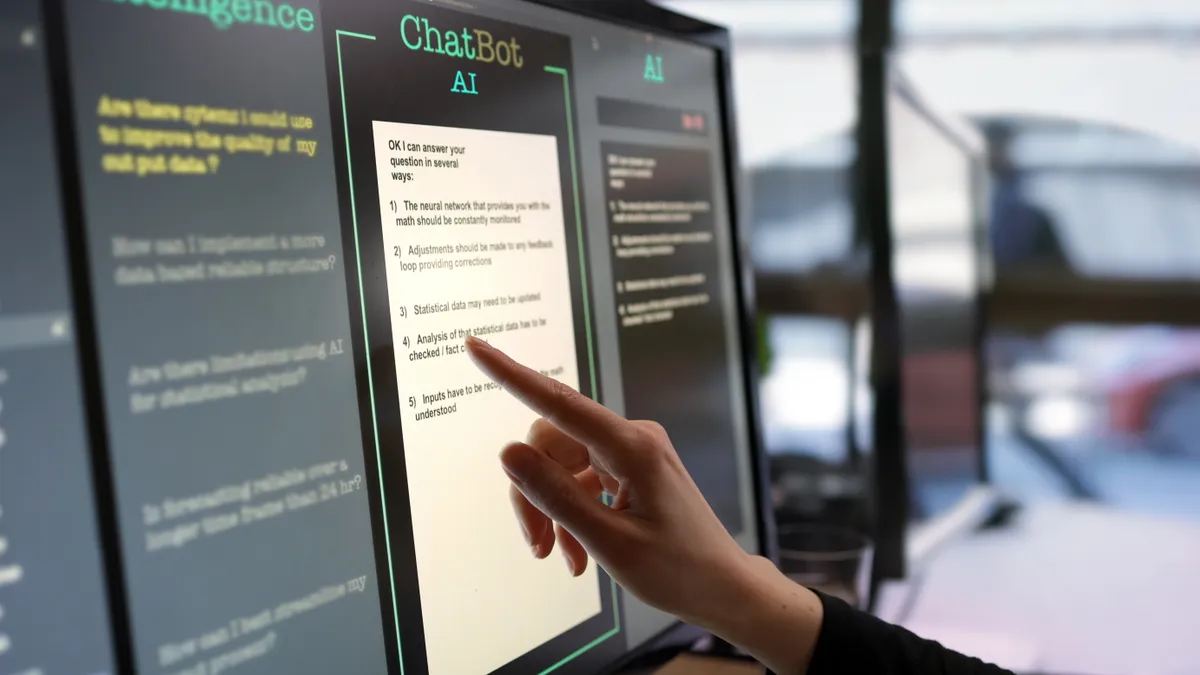Dive Brief:
-
Data released Monday by certified public accounting firm Kruze Consulting highlights the astronomical rise of artificial intelligence technology provider OpenAI, which introduced its groundbreaking ChatGPT tool about a year ago.
-
As of the end of October, 57% of Kruze’s client base of more than 800 venture-backed startups were paid customers of OpenAI, up from low single-digit levels before 2023, according to a blog post written by Healy Jones, Kruze’s vice president of financial strategy.
-
“This is the steepest adoption curve that I’ve ever seen — over half of our client base using a new technology in a very short period of time,” Jones said in an interview. “I’m pretty blown away.”
Dive Insight:
Nov. 30 marked a year since OpenAI launched ChatGPT. Within months of its debut, the tool surpassed both Instagram and Spotify as the fastest-growing consumer application in history.
Global management consultancy firm Bain & Company said in a September report that 89% of software companies were already using AI to differentiate their products — 15 percentage points higher than other sectors. The current generation of AI tools and models could help companies speed up 20% of worker tasks without a loss in quality, according to the research.
“The rapid uptake of AI over the past year and the many ways that it contributes to productivity and creativity have generated a broad wave of enthusiasm across the entire tech sector and beyond,” the report said.
Many of the tech startups served by Kruze, which is based in San Francisco, California, are using OpenAI for various operational tasks, including writing marketing copy, assisting in light coding, Excel modeling, and image generation, Jones said in his blog post.
“The rising adoption of OpenAI among startups is a clear indicator of the growing importance of AI in the business world,” he wrote. “Startups are not just using AI for automation but are integrating it into the core of their business operations and products.”
As one of its pricing models, OpenAI offers a $20-per-month subscription plan that guarantees users general access even during peak times when the free version is at capacity. The company also offers a pay-as-you-go pricing model based on the amount of work performed with its application programming interface, or API.
The typical OpenAI user in Kruze’s client base is leveraging the $20-per-month plan for use cases such as coding and marketing, Jones told CFO Dive. Others are regularly incorporating OpenAI features into their own software products, which could potentially cost thousands of dollars per month under the usage-based model, he said.
Ben Parr, co-founder and president of marketing platform provider Octane AI, a Kruze client, said his company’s use of OpenAI technology has delivered both product improvements and — thanks to the buzz around ChatGPT — increased exposure.
“When ChatGPT came out, that resulted in new customers and new opportunities,” Parr told CFO Dive.
During OpenAI’s first developer conference in San Francisco last month, CEO Sam Altman said 100 million people were going to ChatGPT weekly and the company had more than 2 million developers building with its API.
“OpenAI is the most advanced and the most widely used AI platform in the world now,” he told the audience.
Meanwhile, OpenAI’s rapid ascent has placed the company under an intense public spotlight, as it goes through growing pains.
OpenAI abruptly announced the removal of Altman on Nov. 17, and then reversed that decision within less than a week after facing backlash. The chaotic days in between reportedly rattled customers while also leaving the company’s future in doubt.
“I think it really highlights the need to ensure that you have multiple-source vendors for critical functions such as this,” Zoom CFO Kelly Steckelberg said during a CNBC interview at the time. Besides using OpenAI as an AI vendor, Zoom also works with Meta Platforms and Anthropic, in addition to using its own model, she said.












